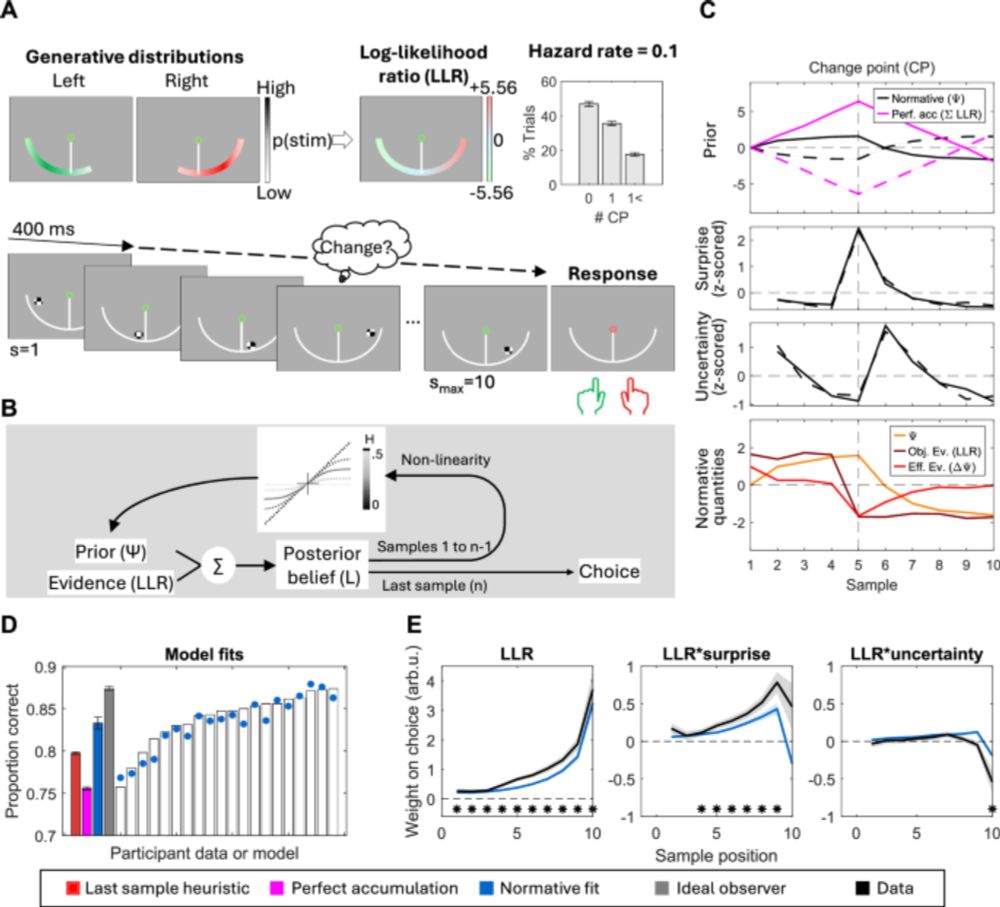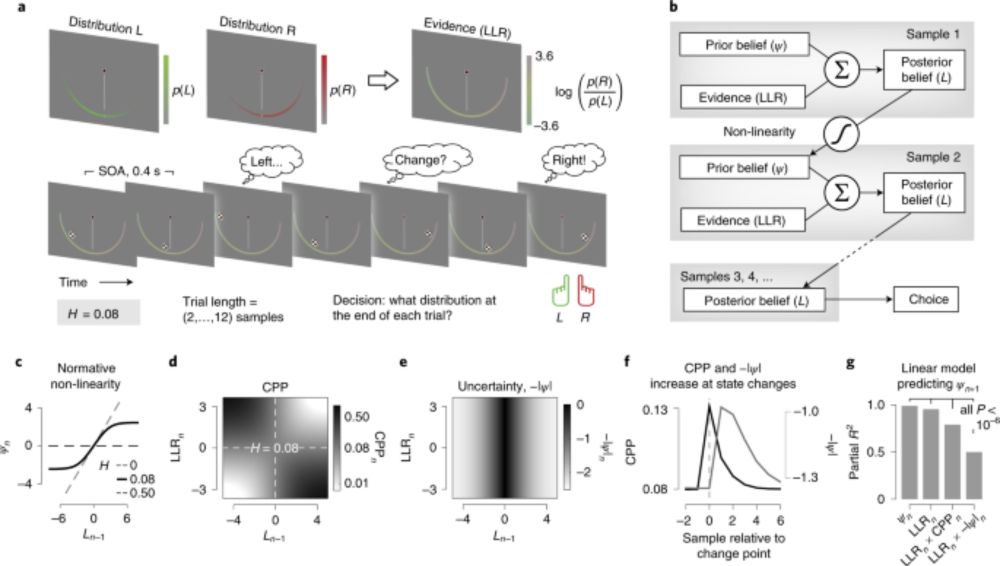

Postdoc position in Paris: come help develop new generation human brain computer interfaces ⚡🧠💻
Interested? Contact me if you have experience with machine learning (e.g. simulation-based inference, RL, generative/diffusion models) or dynamical systems.
See below for + details and retweet 🙏
27.01.2026 22:12 — 👍 75 🔁 56 💬 3 📌 5
** Recruiting a postdoc ** We are looking for a postdoc to work on emotion, mental health, and interoception, based in London at @ucl.ac.uk in my lab (Clinical and Affective Neuroscience). Part of a large Wellcome Grant (co-led with the brilliant @camillanord.bsky.social)
24.11.2025 12:22 — 👍 86 🔁 87 💬 1 📌 1
Our #sEEG study is now published in Nature Communications: rdcu.be/eIkoG! 🧠
Key finding: We discovered neural evidence accumulation for visual perception that's independent of report preparation—recorded from >3000 channels across 3 experiments!
#Neuroscience #Consciousness #OpenAccess
29.09.2025 15:27 — 👍 38 🔁 15 💬 0 📌 2
Overall, our results highlight how prominent neural decision signals may take different shapes in different contexts, and how probing them using tasks that depart from conventional ones can provide important insights into their functional roles. Thanks for reading this far!
26.09.2025 18:23 — 👍 1 🔁 0 💬 0 📌 0

Model-based simulated EEG data
A simple bounded accumulation model could capture the key behavioural patterns in our data, and model-based simulations were able to reproduce the condition-specific profiles of the neural data (CPP & MBL) following each pulse 👇
26.09.2025 18:23 — 👍 0 🔁 0 💬 1 📌 0
Our participants sometimes terminated decisions early, tending to use the second pulse less than the first one, and CPP amplitudes following each pulse reflected this differential weight on choice (i.e. small CPP, small weight on choice), also capturing condition-specific differences in the effect.
26.09.2025 18:23 — 👍 0 🔁 0 💬 1 📌 0
This transient pattern of activity stands in contrast to motor beta lateralisation (MBL), which keeps track of the total sum of accumulated evidence throughout the intervals between pulses and until response.
26.09.2025 18:23 — 👍 0 🔁 0 💬 1 📌 0

We show that when noisy evidence for a single decision comes in temporally separate pulses, the centroparietal positivity (CPP) tracks multiple rounds of evidence accumulation, falling back down to baseline during the intervals in between pulses when no relevant info is presented.
26.09.2025 18:23 — 👍 0 🔁 0 💬 1 📌 0
Perceptual glimpses are locally accumulated and globally maintained at distinct processing levels
Check out our reviewed preprint, now out in eLife!
With @spk3lly.bsky.social, @redmondoconnell.bsky.social and Anna Geuzebroek
elifesciences.org/reviewed-pre...
While we work on improving the [solid] paper based on the reviews, here are the key take-home messages:
26.09.2025 18:23 — 👍 9 🔁 7 💬 1 📌 0
Common neural choice signals reflect accumulated evidence, not confidence! Now out in @cerebralcortex.bsky.social w @helenevanmarcke.bsky.social @pierreledenmat.bsky.social @yfvisser.bsky.social @denizerdil.bsky.social a.o.
Paper: desenderlab.com/wp-content/u... Thread ↓↓↓
19.09.2025 10:47 — 👍 47 🔁 21 💬 1 📌 0
Will you be at #ICON2025 in Porto?
Then drop at our symposium on "Decision Signal(s) In The Electro-encephalogram" (SY23, Thursday at 13.45) with @redmondoconnell.bsky.social @nunezanalyzed.bsky.social @tarrynbalsdon.bsky.social @hcp4715.bsky.social organized by Leendert van Maanen and Jelmer Borst
15.09.2025 08:49 — 👍 10 🔁 3 💬 2 📌 2
Excited to be in Porto for #ICON2025! I will be at poster session 2 tomorrow (Tuesday) afternoon (P2.20) talking about evidence accumulation and choice-encoding centroparietal signals in the human EEG. Come say hi!
15.09.2025 15:58 — 👍 4 🔁 1 💬 0 📌 0
📢Fully Funded PhD position in Barcelona!
I'm excited to announce that I’m opening a PhD position at @idibaps.bsky.social, Barcelona!
We'll investigate the role of bodily signals in autobiographical memory, using virtual reality, EEG and TMS, in healthy volunteers and patient populations.
15.09.2025 08:54 — 👍 14 🔁 7 💬 2 📌 2
Excellent piece.
We know how to improve writing ability: it's by doing more, not less of it.
"LLMs do not improve one’s writing ability much like taking a taxi does not improve one’s driving ability. Students should hone their writing, thinking, and other academic skills at every opportunity."
13.09.2025 08:13 — 👍 51 🔁 24 💬 0 📌 0

Two flagship papers from the International Brain Laboratory, now out in @Nature.com:
🧠 Brain-wide map of neural activity during complex behaviour: doi.org/10.1038/s41586-025-09235-0
🧠 Brain-wide representations of prior information in mouse decision-making: doi.org/10.1038/s41586-025-09226-1 +
03.09.2025 16:22 — 👍 124 🔁 69 💬 2 📌 12
New paper from the lab indicates some surprising differences in visual cortical contributions to two popular VEP types.
In it, Kieran uses some of his brilliant tricks from last year's paper:
21.08.2025 10:35 — 👍 4 🔁 1 💬 0 📌 0
Check out our new multisensory decision study!
We tackle a decades-old Q: does faster detection of bimodal targets come from a race or co-activation between modalities? And also a vital, orthogonal Q: is it one decision process or two?
A1: co-activation
A2: two!
Read here: rdcu.be/eASYd
21.08.2025 10:54 — 👍 19 🔁 11 💬 1 📌 0

CONVERSATIONS ON CONSCIOUSNESS
How the CCN Community Can Contribute
#CCN2025 on Wednesday 13th (10am 🇪🇺)
Livestream link below
➡️ Exploring the possibility of Computational Consciousness Science
➡️ Discussing three Templeton World Charity Foundation Adversarial Collaborations
10.08.2025 16:25 — 👍 56 🔁 14 💬 1 📌 2
Pattern-pulses and pattern-reversals evoke different cascades of cortical sources in the multifocal visual evoked potential | JOV | ARVO Journals
Delighted to share this paper, now published in @arvoinfo.bsky.social. With @spk3lly.bsky.social and Anna Geuzebroek we explored differences in visual cortical responses for pattern pulses and pattern reversals. Here's the link:
jov.arvojournals.org/article.aspx...
29.07.2025 13:33 — 👍 10 🔁 6 💬 0 📌 1
1/3 Check out our new commentary bsky.app/profile/imag....
01.07.2025 15:38 — 👍 10 🔁 5 💬 1 📌 1
We believe our results hint at a flexible neural architecture that can adapt to different decision contexts, and highlight how the CPP may play a key intermediary role in adaptive evidence accumulation. Stay tuned for upcoming related work, and thanks for reading!
28.04.2025 08:33 — 👍 0 🔁 0 💬 0 📌 0
The way that the CPP behaves in this task seems very different from its well-established characteristics in static contexts with continuous evidence (e.g. classic random dot motion tasks), where it reflects the absolute cumulative sum of evidence.
28.04.2025 08:33 — 👍 0 🔁 0 💬 1 📌 0
Further, we found that the centroparietal positivity (CPP) tracks effective evidence (i.e. it reflects how much a DV changes following a token, rather than just stimulus information), but it does not keep a sustained representation of the DV.
28.04.2025 08:33 — 👍 0 🔁 0 💬 1 📌 0
Because the normative solution to this task does not prescribe perfect accumulation, we could dissociate objective evidence presented on the screen from effective evidence (i.e. the belief updates that each token triggered), and map these quantities onto neural signals.
28.04.2025 08:33 — 👍 0 🔁 0 💬 1 📌 0
We used an expanded judgement task where participants watched a slow sequence of discrete tokens (400 ms per token, up to 10 tokens) which favoured one of two possible choices. The task was volatile, which means that the choice supported by the tokens may change within a trial.
28.04.2025 08:33 — 👍 0 🔁 0 💬 1 📌 0
Book: https://thecon.ai
Web: https://faculty.washington.edu/ebender
Catedràtic d'Universitat, Doctor, Professor i investigador a Blanquerna-URL, EUM-UdG, Euncet-UPC, EAE-UdL, UPF, President de la SCC-IEC, Director del CECABLE, escriptor, terrassista
Anthropology and archaeology collections from world cultures past and present.
https://www.prm.ox.ac.uk
I am an assistant professor at Tilburg University's Department of Social Psychology.
I have a website at https://vuorre.com.
All posts are posts.
INSERM group leader @ Neuromodulation Institute and NeuroSpin (Paris) in computational neuroscience.
How and why are computations enabling cognition distributed across the brain?
Expect neuroscience and ML content.
jbarbosa.org
Creative Brain Week: A heady mix of World-Leading Neuroscientists, Educationalists, Health Policy Makers, Artists and Innovators exploring the brain and creativity.
Takes place on the week of June 9th 2025.
www.creativebrainweek.com
Assistant Research Professor at the MRC Cognition and Brain Sciences Unit, University of Cambridge. Trained in clinical psychology, studying transdiagnostic approaches to mental health. #empathy #uncertainty #rstats enthusiast. Curious about most things 😊
Filial de l'Institut d'Estudis Catalans
History and Philosophy of Science, Cognitive Science,Experimental Philosophy, distinguished Prof at Pitt, Director of the Center for Philosophy of Science
L'Institut de les Ciències i les Humanitats i Acadèmia de la Llengua Catalana. Amb 5 seccions i 28 societats filials.
Established in 2024, SPAN is a philosophical and scientific society dedicated to providing a forum for the collaboration between philosophers and neuroscientists. philandneuro.com | thefeedback.blog
Researcher. Working at the intersection of neuroscience, AI, and robotics. Also into physics, ALife, complexity, filmmaking, philosophy, and space.
Check out my longer posts on Substack (mostly detailed tutorials about data science and LLMs). mikexcohen.substack.com
Explore my video-based courses and books ➔ sincxpress.com
Postdoc/Humboldt fellow at CENs, University of Bonn, Germany
Former postdoc at the FINN lab, Dartmouth College, NH, USA
I study how the brain makes up the mind
Delusions, Hallucinations
Prediction Errors, Priors
Beliefs, Perception
He/Him
belieflab.yale.edu
Postdoc with @brognition.bsky.social studying how attention, working memory, and speech unfold in time 🧠
Cognitive Neuroscientist in Amsterdam
proactivebrainlab.com
Across many scientific disciplines, researchers in the Bernstein Network connect experimental approaches with theoretical models to explore brain function.
CNRS Researcher (DR) at CerCo, in Toulouse (France). Interested in brain oscillations and visual perception/ awareness.
Prof Redmond O'Connell's lab, Trinity College Institute of Neuroscience. Seeking to understand the neural mechanisms underpinning high-level cognition.
https://oconnell-lab.com/home/opportunities/









